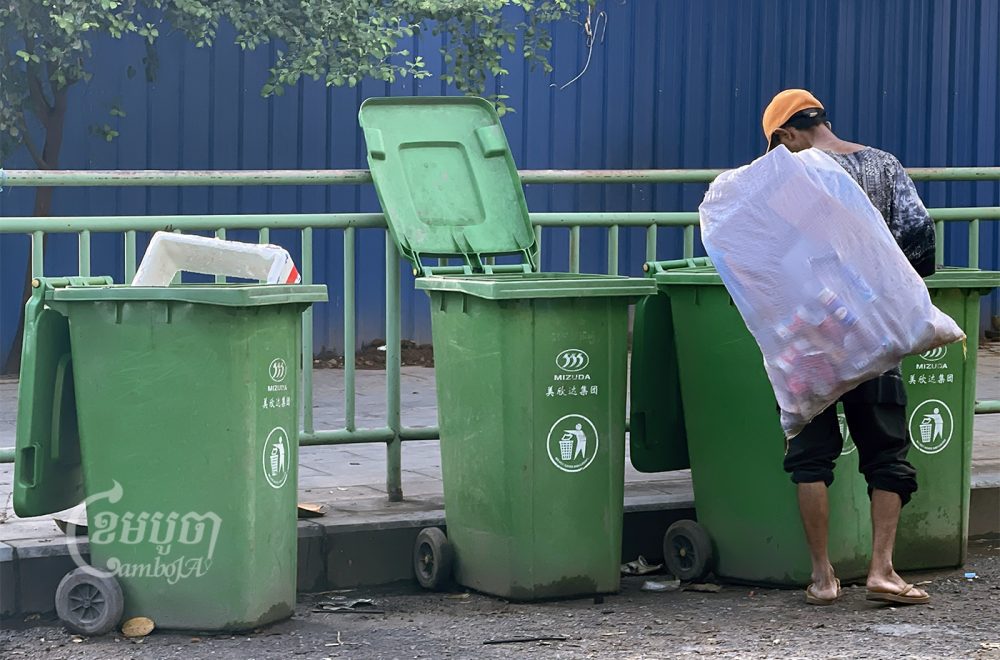Cambodia continues to have a problem with waste disposal and lacks an efficient waste management system, experts said at the 2022 Waste Summit held on August 13, but scavengers are filling the gap and have become the “biggest contributors to Cambodia’s waste recycling efforts.”
Cambodia’s rapid urban expansion means waste is often not separated and recycled and it all eventually ends up together in landfills across the country.
Not only are resources being wasted, but this also hurts the environment, society, and the economy, according to Daniel Schmücking, country director of German NGO Konrad Adenauer Stiftung (KAS), one of the organizations that attended the event along with the Ministry of Environment.
But because of this an unlikely hero has emerged.
“Often forgotten and not officially recognized, informal waste pickers, commonly known as Adjai, and people working in the informal sector are the biggest contributors to Cambodia’s waste recycling efforts,” said Schmücking.
Pak Channa, a 40-year-old mother of three children who lives in Phnom Penh’s Meanchey district, is one of them.
She told CamboJA that she collects waste at the landfill in Dangkor district, including aluminum cans, plastic bottles and other material.
As her husband is ill and unable to work, her scavenging supports the whole family. She says she sells the waste she collects to buyers at the dump and can earn as much as 30,000 riels ($7) from what she’s scavenged.
Channa said it is a tiring, dirty and dangerous job but she does it so her children can have a better life. She’s also pleased she helps reduce the amount of garbage in the landfill.
“Collecting waste I face many challenges such as exposure to disease, heat, and accidents involving dump trucks, tractors, and bulldozers,” Channa said.

Chheb Sreyorn, 30, is another informal waste collector in Dangkor district. She told CamboJA that she has been a scavenger for four years and her husband is too. Between them she said they can earn up to 60,000 riels a day.
“My husband and I take turns to collect the waste. My husband collects at night and I do it in the afternoon because my son is young so I cannot take him along,” Sreyorn said.
However, with an extended family to support, Sreyorn says it’s hard to make ends meet with the money they earn.
“We help reduce a lot of waste and at the landfill there are suppliers to buy more paper bags and plastic garbage. But the price is too cheap,” she said, adding that she wants the market price of scrap to be a bit higher.
According to Noun Monika, program manager for Sustainability and Digitalization at KAS, Cambodia generates some 4.09 million tons of municipal solid waste per year. By 2050, that amount is projected to grow by 300%.
She says about 63% of waste is collected (formal collection), 29% is illegally dumped and burned, and informal collection for recycling accounts for 8%.
Chau Kim Heng, Director of the Cambodian Education and Waste Management Organization (CAMPED), said that his organization focuses on collecting non-recyclable plastic waste and selling it as scrap.
He added that they regularly collect garbage thrown by the public in rivers and public places and dispose of it at Chip Mong Ecocycle in Kampot province.
“We have four garbage collection destinations so the plastic waste we collect comes to at least 200 to 300 kilos a day,” Kim Heng said, adding that in a month, his company can send some 10 tons of plastic waste to Chip Mong recyclers.
He said people should be taught not to litter and how to correctly dispose of their plastic and waste and there must be laws to prevent people from incorrectly disposing of their rubbish..

For his part, Heng Narith, an undersecretary of state at the general directorate of environmental protection in the Ministry of Environment, said at the waste summit that the problem was two-fold: an increase in the amount of waste generation as well as the lack of an effective waste management system from source generation to the final result.
“As you may already know, solid waste management in Phnom Penh is currently undergoing profound reform,” he said, explaining that the ministry has been working to address the challenges of solid waste management.
It has decentralized power and responsibility to the sub-national, city, and district levels, to strengthen the management of solid waste in their areas, he said.
He also acknowledged that informal waste workers play an important role in recycling and preventing plastic from being dumped in the rivers and ocean, and said they fill the gaps municipal waste management authorities are unable to cover.
KAS’s Schmücking said that informal waste collectors reduce the amount of waste that goes into landfill, which is environmentally beneficial. He said the key to proper waste management is the separation of plastics, paper, glass, and aluminum, which also means recycling companies get the products they need.
But, he said, the informal collectors need to work more with the recycling companies.
“The waste collectors are not really connected to the recycling factories. That’s problematic and I think that it needs to change, and then the whole situation will change,” he said.








